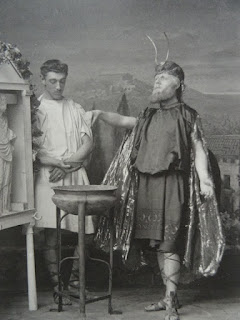The plays of Aristophanes are more context-dependent than anything else we’ve been reading, the comprehension, set aside the humor, of many passages requiring some help with the history and social details. Late in his career, he will begin to work on the problem, and Menander will finish the job. A little preview there of were we are going in the fall. Comedy will become more universal, and stupider.
Still, some plays need more context and some less. Peace (421 BCE), the last of an
amazing surviving five-play run, is on the “more” side. Its effect depends on knowing that the leading
pro-war figures on both the Spartan and Athenian sides (the latter is
Aristophanes’s recurring punching bag Cleon) were recently killed in battle,
and that genuine peace negotiations were in progress for the first time in a
decade. Peace would be declared within a
few weeks. It wouldn’t last long, but I’ll
take that as a separate issue.
The stake in Peace are high, is what I am trying to
say. “Don’t screw this up.”
Having said that, the long opening scene is pretty pure, as
two slaves make big dung balls, right there on stage, and feed them to a giant
dung beetle, which then flies the protagonist to heaven where he wants to beg
the gods for peace, which all works out after a few hitches. That’s Peace over on the right, and the dung
beetle in the lower center.
FIRST SLAVE: I expect by now someone out there is asking – some young fellow who always knows the answers, but not this time – asking ‘What’s this all about? What’s the beetle mean?’ and the Ionian visitor next to him is telling him ‘Ah think it’s all an allego-ry about Cleon, ‘cahz, you see, he’s eatin’ shit these days down amerng the dead men, you know!’ (99, tr. Alan H. Sommerstein)
My impression is that Peace has more jokey fourth-wall-breaking
than any Aristophanes play yet, and they’ve all had plenty. The hero, wildly flying on his beetle, asks
the crane operator to be more careful.
The ritual sacrifice of a lamb is moved offstage because “That way our
sponsor won’t lose his lamb” (133). Just
for examples. Maybe it’s the translator
who likes those gags and emphasizes them.
The chorus leader gets his now expected address to the
audience, asking for the prize. This
time Aristophanes argues for his place as an innovator, his place in literary
history:
He stopped his rivals poking fun at rags
And waging war on paltry fleas and lice;
He put an end to scenes where Heracles
Kneads dough, or waits and waits and waits for dinner…
Our poet’s booted all that rubbish out
And given us works of art, great towering structures
Of words and thoughts, and jokes that are not vulgar. (123)
That last bit is so blatantly false – trough full of manure,
etc. – that it must have gotten a big
laugh. The other parts, though, are why I wanted tot read the plays chronologically.
I again borrowed images from the archives of The Cambridge Greek Play, this time from a 1927 performance of Peace double-billed with our play for next week, the Elektra of Sophocles, which I remember as an extraordinary masterpiece, ho hum, the usual Sophocles business. I’ll be reading the Anne Carson translation.





